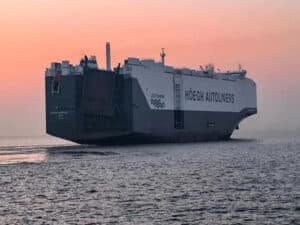
UNCTAD: Shipping decarbonization can’t wait
Written by Nick Blenkey
Image: UNCTAD
Not that you’d know it from any excitement in the streets, but today, September 28, is World Maritime Day and, ahead of it, UNCTAD, the UN Conference on Trade and Development, yesterday released its Review of Maritime Transport 2023.
As ever, it is a mine of statistical information, and some of the take-aways from those stats underscore the need for shipping to accelerate its decarbonization efforts.
“Maritime transport needs to decarbonize as soon as possible, while ensuring economic growth,” said UNCTAD Secretary-General Rebeca Grynspan. “Balancing environmental sustainability, regulatory compliance and economic demands is vital for a prosperous, equitable and resilient future for maritime transport.”
While the transition to cleaner fuels is in its early stages, with nearly 99% of the global fleet still reliant on conventional fuels, the report cites promising developments, including 21% of vessels on order being designed for alternative fuels.
GREEN TRANSITION IS EXPENSIVE
On the other side of the coin, the green transition comes with substantial costs. UNCTAD reports that an additional $8 billion to $28 billion will be required annually to decarbonize ships by 2050, and even more substantial investments, ranging from $28 billion to $90 billion annually, will be needed to develop infrastructure for 100% carbon-neutral fuels by 2050.
Full decarbonization could elevate annual fuel expenses by 70% to 100%, potentially affecting small island developing states (SIDS) and least developed countries (LDCs) that heavily rely on maritime transport.
To ensure an equitable transition, UNCTAD calls for a universal regulatory framework applicable to all ships, irrespective of their registration flags, ownership or operational areas, thereby avoiding a two-speed decarbonization process and maintaining a level playing field.
“Economic incentives, such as levies or contributions paid in relation to shipping emissions may incentivize action, can promote the competitiveness of alternative fuels and narrow the cost gap with conventional heavy fuels,” said Shamika N. Sirimanne, UNCTAD’s director of technology and logistics. “These funds could also facilitate investments in ports in SIDS and LDCs, focusing on climate change adaptation, trade and transport reforms, as well as digital connectivity.”
AGING WORLD FLEET
UNCTAD is also concerned by the ageing global shipping fleet – at the start of 2023, commercial ships were on average 22.2 years old, two years older than a decade ago. More than half of the world’s fleet is over 15 years old.
Ship owners face the challenge of renewing the fleet without clarity regarding alternative fuels, green technology and regulatory regimes to guide ship owners and ports, while port terminals face similar challenges in vital investment decisions.
INVASION OF UKRAINE UPS CARGO DISTANCES
Driven by continuing disruptions from the war in Ukraine, oil cargo distances reached an all-time high in 2022, and shipments of grain in 2023 have travelled further than in any year on record, as grain importing countries have been forced to seek alternative exporters such as the US and Brazil, which require long-haul shipping.
- More, much more than we can summarize here, in the full report, download it HERE




